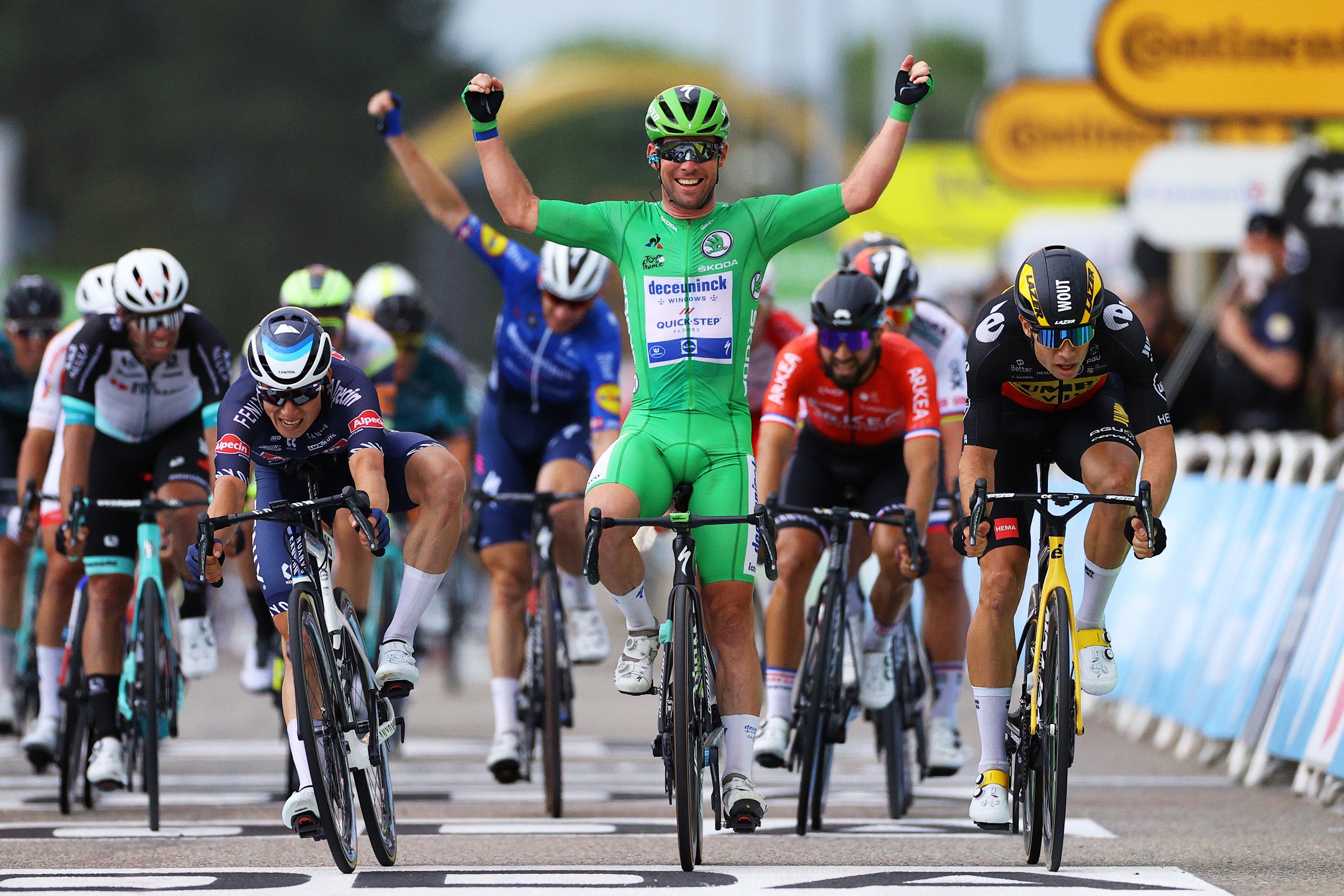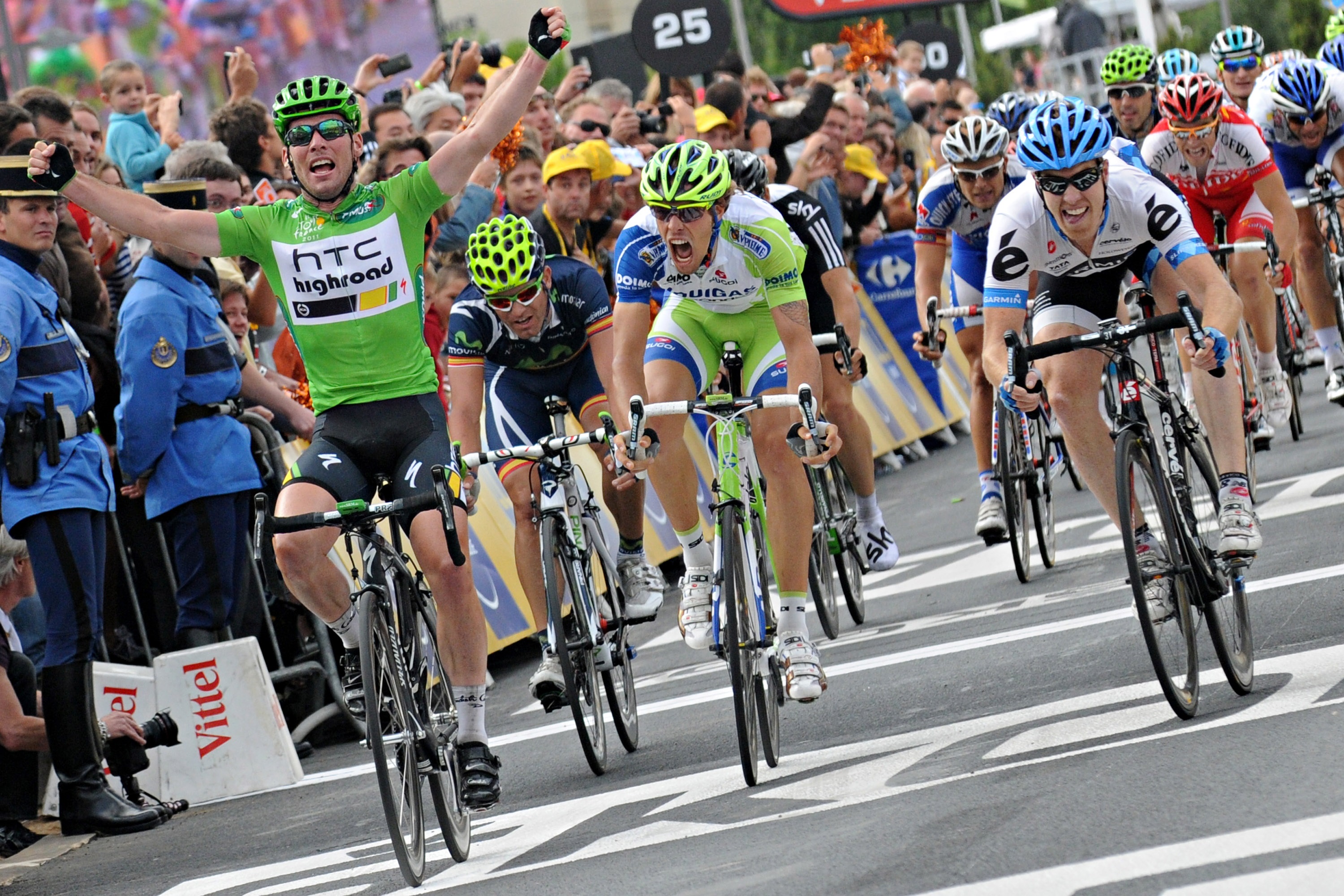
There has never been, and possibly will never be, a greater sprinter in the history of the Tour de France than Mark Cavendish. As the Manx Missile prepares to hang up his racing wheels after almost two decades in the sport, he will do so with a 14th and final appearance in the race that has defined him as much as he has defined it.
From a debut on home soil right through to two green jerseys and a record-equalling 34 stage wins, Cavendish’s relationship with the Tour has been as up and down as his career as a whole, with enormous highs and the deepest lows.
Starting out Cavendish made his Tour de France debut as a neo-pro in 2007 aged just 22, earning selection not just because of the race’s start in London, but because he had been building up a collection of impressive victories, including at the sprinters’ Classic Scheldeprijs and two stages each at the Four Days of Dunkirk and Volta a Catalunya.
“Today when a rider turns pro we know everything about them, but with Mark it was a blank piece of paper, but as soon as he started delivering we could see the first signs of his power, of his immense speed,” remembers his longtime teammate and friend Bernie Eisel. “Even though everyone was still asking, ‘Who the hell is Mark Cavendish?’ and we had no idea what his trajectory was, we could all see his speed.”
The Tour, however, was an altogether different beast, and Cavendish was like the proverbial fish out of water.
“The Tour was a massacre for him in all honesty,” Eisel laughs. “He was too nervous and there were too many crashes, especially in London. It was all too much for him, and I remember one time he crashed into some spectators. A lot of the other crashes were just him being a young rider and not being in the right spot. It was a complete mess.” His best results were a ninth and 10th in back-to-back stages in the opening week.
A young Cavendish was “shy” according to Eisel, but he didn’t let the mishaps spoil the experience for him, before he DNFed on stage eight; the plan was for him to leave the race on the first rest day. “He didn’t take it to heart,” Eisel says. “He was soaking everything up, and he knew that his first Tour was all a learning process.
“It was his first time with the big sprinters in a big Tour de France bunch and he was appreciating what it took to win these races and everything else that came with it. He knew he had to learn a lot, but we had a nod of what was going to come from him.”

Cavendish’s first wins at the Tour came in 2008 when he scored a hat-trick of triumphs racing for Team Columbia, but the year after he was to double that tally, dominating almost every sprint he took part in.
“2009 was his best ever Tour – he was head and shoulders above the other guys,” says Mark Renshaw, his final leadout man in his pomp years. “We’d win a stage, celebrate that evening, and then it was like, ‘Right, Google Maps and analyse finishes with screenshots of corners and landmarks.”
Cavendish won five stages in each of the next two Tours, as well as the points classification in 2011, writing himself into Tour folklore as the finest sprinter of all time while still in his mid-20s. “It was the peak of his career and he was so unbeatable I think because he was still on an upward trajectory rather than a plateau,” Renshaw says. “He hadn’t yet reached a peak so the drive within was the highest it had ever been for him.”
He won four successive times on the ChampsÉlysées, the first three of those with the various guises of HTC-Columbia.
“Today the sprinters are looking over their shoulders with 300m to go, but back then Hincapie went at one kilometre to go and never looked back because he knew Cav would finish it off,” Renshaw adds.
“Cycling is a team sport, and winning in Paris came down to the work of the team more than any other stage.”
Another Dimension
Following three years at Omega Pharma-Quick Step that only brought with it as many Tour stages – largely to do with the barnstorming emergence of Marcel Kittel – Cavendish found his mojo once again at Dimension Data.
On the first stage of the 2016 Tour he achieved a career-long ambition by taking the yellow jersey, and he would go on to claim a further two stage victories in the opening week and then added a fourth to his collection on stage 14.
That was never the expectation: Cavendish, who had built track work back into his training ahead of the 2016 Olympics, had won just three times all season before the Tour, and though the team had backed him by recruiting Renshaw and Eisel, very few outside of their bubble was banking on Cavendish winning big. “He hadn’t had great form before then but with Cav there was always pressure just because he was Cav,” remembers his teammate Serge Pauwels.
“We weren’t like Ineos or Jumbo-Visma today, teams with big budgets, so what he did in 2016 was really quite spectacular.”
Cavendish departed the race on the second rest day to finalise his preparations for the Rio Olympics, forgoing a chance at winning once again in Paris.
“He won silver in the omnium but wasn’t selected for the team pursuit, and I know he regrets not staying in the Tour as we are all sure he’d have won on the Champs-Élysées,” Pauwels says.
Upon leaving the Tour, Cavendish had a present for his teammates. Pauwels explains: “He sent a message in the WhatsApp group at 12pm asking us all to be in the hotel lobby at 4pm. When we arrived, a guy with white gloves looking like he was from James Bond opened up a suitcase and inside was a Rolex watch for each of us with our names and ‘Tour de France 2016’ engraved on the back. That was Cav’s way of saying thank you for the work we’d done.”
Those wins, however, were to be his last at the Tour with Dimension Data. In 2017 he contracted the Epstein-Barr virus in the spring and then crashed out on stage five. The year after he failed to make the time cut on stage 11, and then wasn’t selected in 2019 after falling out with team manager Doug Ryder. His journey with the South African team ended bitterly, but he will always have that golden first year. “We had the best sprinter in the world and we all knew it,” Pauwels says.
When Cavendish re-signed for Deceuninck-Quick Step in 2021, just months after he admitted he was on the verge of an unwanted but enforced retirement, many had questioned Patrick Lefevere’s choice. “In a word, Mark was a joke,” his longtime friend and frequent sports director Brian Holm remembers. “People could not believe he was back at Quick Step. They were laughing at us.” Cavendish hadn’t won in the Tour since 2016 and hadn’t won a race since February 2018, illness, injury and depression all adding up to his longest winning drought.
Four stage wins at the Tour of Turkey in April 2021, however, was a reminder of his class. “His new coach [Vasilis Anastopoulos] took him to Greece, rode the Derny in front of him, and really looked after him,” recalls Holm, a DS at Quick Step at the time. “No one was really sure he would make the selection, it was a risk, but Vasilis really believed in him and was so enthusiastic.” Controversially, Cavendish, 36 at the time, was selected for the Tour team over the reigning points classification champion Sam Bennett – but the decision paid off, the Briton winning four stages to draw level with Eddy Merckx on a record 34 stage wins.
Holm was working for Eurosport in Denmark during that Tour. “I’ll never forget when he called me after his first win,” he says. “I got back home, bought some cigarettes and went outside in the garden to drink a gin and tonic and smoke alone. It’s something I’d never normally do but that evening I had to. I needed a private moment to take it all in. As I was sitting alone, Cav called me. He would have known I was emotional. It’s the only time I’ve ever come close to crying from sport.
“It’s difficult to measure happiness, but the day Cav made his comeback was the happiest day of my life in cycling. All of the stuff behind the scenes, securing the money to get him back, working hard to get him on the right track. He might not like it but I call him the Paul Potts of cycling: no one believed in him until he started singing, and it’s the same with Cav. He’s had to prove himself throughout his career, and every time he has done.”
This feature originally appeared in the 29 June 2023 issue of Cycling Weekly's print edition.







